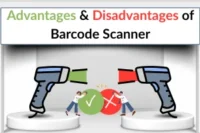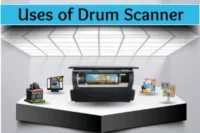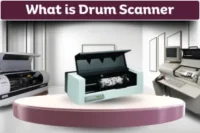Advantages and Disadvantages of Drum Scanner
Published: 10 Oct 2025
A drum scanner is a powerful tool that scans images with rich color and sharp detail. Many professionals in printing and photography still use it for high-quality work. But like every device, it has both strengths and weaknesses. In this simple guide, we’ll explore the main advantages and disadvantages of drum scanner to help you understand it better.
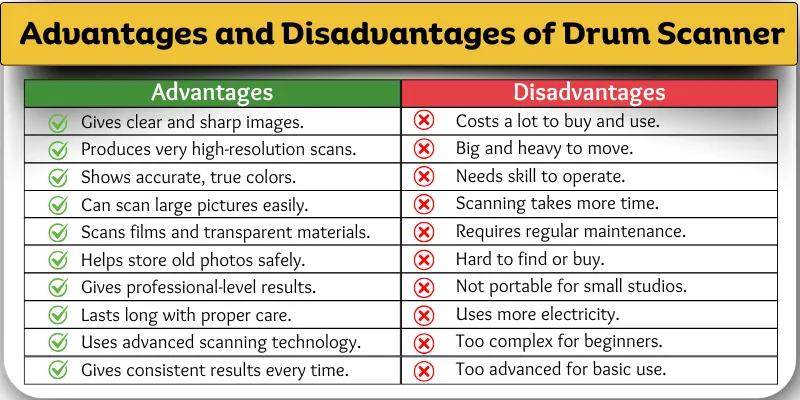
Advantages and Disadvantages of Drum Scanner
A drum scanner gives amazing scan results with fine color and detail. Still, it has a few limits that users should know. Let’s quickly see the key benefits and drawbacks of drum scanner in simple words.
10 Advantages of Drum Scanner
A drum scanner is known for its top-quality results and fine details. It helps professionals get clear, sharp, and color-true images. Let’s see the main advantages that make it stand out from other scanners.
- Excellent Image Quality
- High Resolution Output
- Accurate Color Reproduction
- Large Format Support
- Film and Transparency
- Ideal for Archiving
- Professional Grade Results
- Long-Term Durability
- Advanced Scan Technology
- Consistent Performance
Let’s discuss the above pros of the drum scanner in detail.
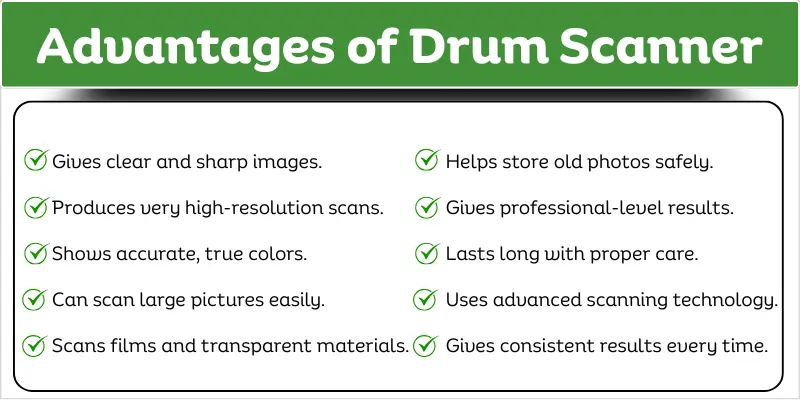
Excellent Image Quality
Drum scanners give the best image quality among all scanners. They capture every small detail with sharp edges and smooth tones. The output looks clean and professional, even when enlarged.
High Resolution Output
Drum scanners produce very high-resolution images. They can capture tiny details that other scanners often miss. This makes images sharp and clear, even when printed in large sizes. Professionals prefer them when they need precise and detailed scans for photos, art, or films.
Accurate Color Reproduction
Drum scanners capture colors very accurately. They reproduce every shade just like the original image. This helps photographers and artists get true-to-life results. Colors stay vibrant and natural, making the scans perfect for printing and professional work.
Large Format Support
This types of scanners can handle large images easily. They scan wide photos, posters, or artwork without losing detail. This makes them ideal for projects that need big, high-quality scans. Users can work on large formats without cutting or resizing the original image.
Film and Transparency
Drum scanners can scan films and transparent materials with great clarity. They capture all details from negatives, slides, and transparencies. This makes them perfect for photographers and studios working with old or delicate film.
Ideal for Archiving
Drum scanners are perfect for archiving important images and documents. They preserve every detail and color accurately. Old photos, artworks, and films can be saved digitally without losing quality. This helps museums, studios, and libraries keep their collections safe for the long term.
Professional Grade Results
These scanners deliver professional-grade results every time. They create sharp, detailed, and true-to-life images. Photographers, designers, and printing studios find them ideal for high-end projects. Users can trust the output without worrying about quality loss.
Long-Term Durability
Drum scanners are built to last for many years. They maintain high performance even with frequent use. This makes them a reliable choice for studios and professionals.
Advanced Scan Technology
This scanner uses advanced technology to capture images with incredible detail. It reads every color and texture accurately. Professionals can scan complex artwork, films, or photographs with ease.
Consistent Performance
With every use, this scanner delivers reliable and steady results. Images stay sharp, colors remain accurate, and details are never lost. Professionals can count on it for daily work without worrying about errors.
10 Disadvantages of Drum Scanner
Drum scanners are powerful, but they are not perfect for everyone. They have some limits that beginners and small studios should know. Let’s check the main disadvantages that can affect use and cost.
- Very High Cost
- Bulky and Heavy
- Complex Operation
- Needs Skilled User
- Slow Scanning Speed
- Regular Maintenance
- Hard to Find
- Not Portable
- High Power Use
- Too Advanced for Basic Use
Now, we will explore the drawbacks mentioned above in a simple way.
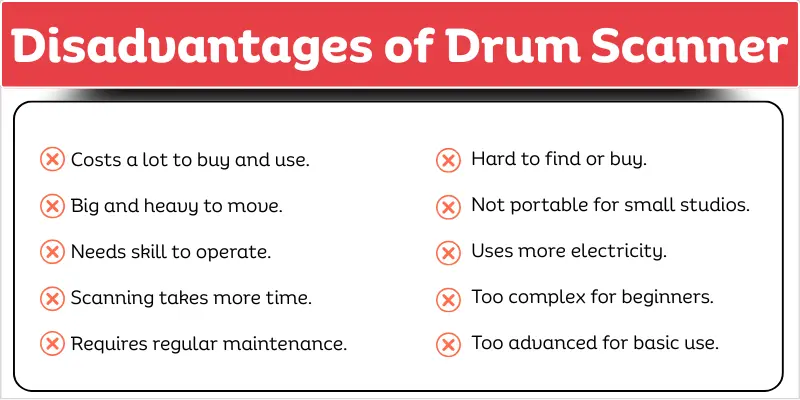
Very High Cost
Drum scanners are expensive to buy. They cost much more than normal scanners or flatbed scanners. This makes them hard for beginners or small studios to afford. Only professionals or large studios usually invest in one for high-quality work.
Bulky and Heavy
Drum scanners are large and take up a lot of space. They are heavy and hard to move around. This makes them less suitable for small studios or home use. Users need a dedicated area to keep and operate them safely.
Complex Operation
Using a drum scanner is not simple for beginners. It has many settings that need careful adjustment. Users must know how to handle it properly for best results. Without experience, the scanning process can be slow and confusing.
Needs Skilled User
A drum scanner requires a skilled person to operate it correctly. Beginners may struggle with its controls and settings. Proper handling is important to get high-quality scans. Without experience, users may make mistakes or damage the equipment.
Slow Scanning Speed
Drum scanners take more time to scan images than normal scanners. High-quality and detailed scans require patience. This can slow down work in busy studios. Users must plan extra time for each scanning project.
Regular Maintenance
Regular care is important for drum scanners to work well. The parts should be cleaned and checked often. Skipping maintenance can lower scan quality and harm the machine. Following a simple routine keeps it running smoothly and reliably.
Hard to Find
Drum scanners are not easy to buy. They are available only through specialized sellers or professional suppliers. This makes it difficult for beginners or small studios to get one. Users may need extra effort and time to find the right model.
Not Portable
Drum scanners are large and heavy, so you cannot carry them easily. They need a fixed space for use. This makes them unsuitable for mobile work or travel. Users must keep them in one place for all scanning tasks.
High Power Use
Using a drum scanner requires more electricity than normal scanners. A stable power supply is needed for proper operation. This can make energy bills higher for studios.
Too Advanced for Basic Use
Drum scanners are designed for professional tasks, not simple scanning. Beginners may find the controls and features confusing. Basic projects do not need such advanced technology.
Conclusion
So, guys, now let’s wrap up, we have explored the main advantages and disadvantages of drum scanner. It delivers amazing image quality, accurate colors, and professional results, but it also costs more and needs skilled users. If you work with photos, art, or publishing, it can be very useful. Share this guide with friends or studios who want to learn more about drum scanners.
FAQs about Pros and Cons of Drum Scanner
Here are some common questions and answers to help you understand the benefits and drawbacks of drum scanners.
A drum scanner gives excellent image quality and accurate colors. It captures tiny details and supports large formats. Professionals use it for art, photography, and publishing. It is ideal for high-end projects that need precision and sharpness.
Drum scanners are expensive and heavy. They need skilled users and regular maintenance. The scanning speed is slow compared to normal scanners. Beginners may find them too advanced for simple tasks.
Yes, for professional work, drum scanners are better. They provide higher resolution, sharper details, and more accurate colors. Flatbed scanners are easier to use and cheaper, but do not match the quality of a drum scanner.
Professional photographers, designers, and studios should use it. It is best for high-quality image reproduction, archiving, or film scanning. Beginners or casual users may not need it due to cost and complexity.
Usually, no. Drum scanners are costly and hard to operate. Beginners can start with flatbed or sheetfed scanners. Only invest in a drum scanner if you plan to work on professional or large-format projects.
Professionals like drum scanners for their unmatched image quality. They reproduce colors accurately and capture every detail. Long-term durability and consistency make them reliable for high-end work.
Drum scanners are expensive. Prices can range from a few thousand dollars to much higher, depending on the model and features. Most small studios or beginners cannot afford them easily.
Yes, drum scanners are perfect for films, slides, and negatives. They capture all details and produce sharp, high-resolution digital images. This makes them useful for photographers and archives.

- Be Respectful
- Stay Relevant
- Stay Positive
- True Feedback
- Encourage Discussion
- Avoid Spamming
- No Fake News
- Don't Copy-Paste
- No Personal Attacks

- Be Respectful
- Stay Relevant
- Stay Positive
- True Feedback
- Encourage Discussion
- Avoid Spamming
- No Fake News
- Don't Copy-Paste
- No Personal Attacks
